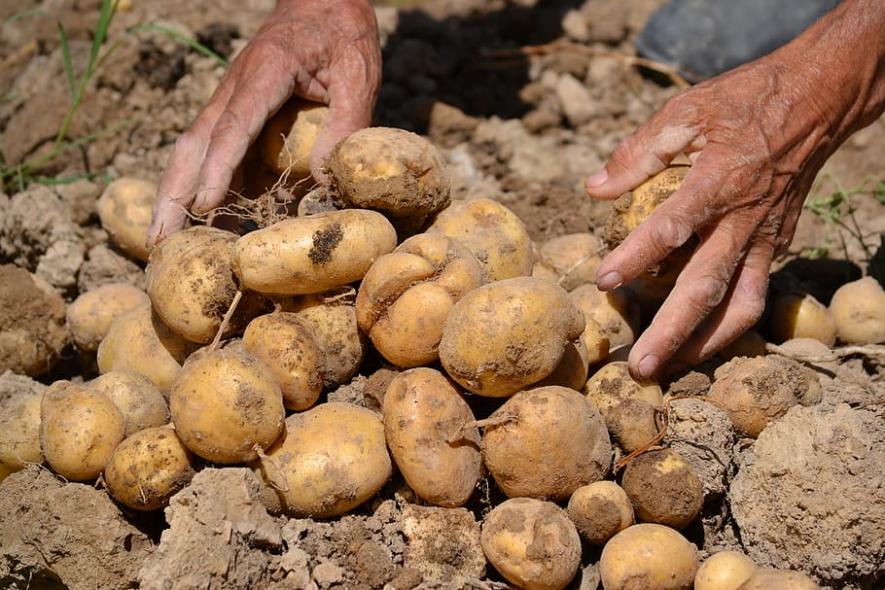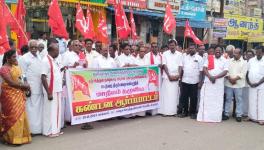UP Potato Farmers Protest ‘Arbitrary’ Cold Storage Rates

Representational Image. Image Courtesy: Wallpaper Flare
Lucknow: Farmers from Kannauj to Agra—Uttar Pradesh’s (UP) potato belt—have been protesting under the banner of the Bharatiya Kisan Union (BKU) and the All India Kisan Sabha (AIKS) in different parts of the western region for the last many days demanding the withdrawal of “unfair rate hike” by cold storage owners.
Agra potato farmers have alleged that cold storage owners are harassing them by increasing rates by up to Rs 60 per quintal.
According to the unions, potato cultivators are losing between Rs 17,000 and Rs 19,000 per hectare even after selling their produce.
A bike procession under the Kisan Sangharsh Samiti was taken to the Collectorate in Kannauj raising slogans against cold storage owners and the district horticulture department for “ignoring” farmers.
Farmer leader Geetendra Singh Yadav, who led the procession, said that the government had fixed the storage rates of plain potatoes at Rs 230 per quintal and sugar-free potatoes at Rs 260 per quintal for 2023-24.
“However, Kannauj cold storage owners charge arbitrarily. The rise in the cost of agriculture inputs, unavailability of fertilisers, erratic rainfall, low mandi rates and arbitrary rate of cold storage owners are a few challenges every farmer faces in any normal agriculture season,” he told Newsclick.
Yadav warned that if cold storage rates aren’t regulated soon, they will be “forced to organise a mass movement on June 12 in Lucknow”.
Kannauj BKU district president Shamim Ahmad said, “Potato production was bumper this year. CM Yogi Adityanath had asked cold storage owners during the harvesting season to charge Rs 230 per quintal. However, the district horticulture department issued a press release and fixed the rate at Rs 260 per quintal. Even then farmers are paying Rs 280-Rs 300 per quintal,” adding that the district administration “turned a deaf ear to our demands”.
Ahmad, who had cultivated potatoes on 60 bighas, said, “Some storage owners charge Rs 280 per quintal and some charge even Rs 300. Due to the high production of potatoes, the cold storages are full. Therefore, owners are charging arbitrary rates from farmers despite the CM asking them to fix a low rate.”
UP, the largest potato-producing state, contributes 35% of the country’s total potato production. The maximum number of stores are in the potato-belt districts of Agra (457), Firozabad (235), Etawah (129), Aligarh (120), Hathras (118) and Kannauj (112).
The situation in Etawah and Mainpuri is not different from Kannauj. Etawah BKU district president Sanjeev Yadav told Newsclick that farmers pay Rs 140 per packet (50-55 kg) and around Rs 275 per quintal, which is Rs 60 per quintal higher than the government rate.
“The arbitrary rates of cold storage owners have caused more burden for farmers. But no one cares,” he added.
Narrating the plight of potato growers, Yadav said, “The state government fixed the price of potato at Rs 650 per quintal despite the Rs 1,000-Rs 1,500 production cost per acre, including rent of tractor trolley, fertilisers, medicine, irrigation, token money, store charges and labour.”
Shayam Singh Chahar, a farmer leader in Agra who has been continuously raising the plight of potato growers, said that the government provides a 30%-40% subsidy for the construction of cold storages in the name of farmers but “it doesn’t benefit farmers. Instead, storage owners increase the rates when the production is high”.
“What is the benefit of giving subsidies to cold storage owners when they increase rates yearly? Faulty policies and the government’s gross mismanagement have forced potato farmers to switch to other means of livelihood,” Singh added.
The farmers claimed that they are forced to sell potatoes to wholesalers for a price below the production cost.
Get the latest reports & analysis with people's perspective on Protests, movements & deep analytical videos, discussions of the current affairs in your Telegram app. Subscribe to NewsClick's Telegram channel & get Real-Time updates on stories, as they get published on our website.























